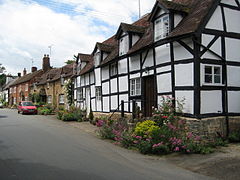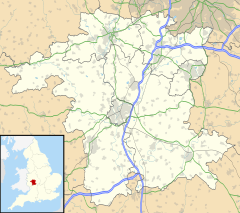This article needs additional citations for verification. (June 2009) |
Elmley Castle is a village and civil parish in Worcestershire, in England, United Kingdom. It is located on the north side of Bredon Hill 3 miles south-east of Pershore in the local government district of Wychavon.
| Elmley Castle | |
|---|---|
 Grooms Cottage | |
Location within Worcestershire | |
| Population | 497 |
| OS grid reference | SO982413 |
| Civil parish |
|
| District | |
| Shire county | |
| Region | |
| Country | England |
| Sovereign state | United Kingdom |
| Post town | Pershore |
| Postcode district | WR10 |
Amenities and history
editThe village had a population of 497 in 2001, and retains public amenities such as a bus route, public house, post office, primary school, local shop selling local produce, and church.
The remaining public house is now called "The Queen Elizabeth Inn", after Elizabeth I, who is supposed to have stopped there. According to local legend, Elizabeth I was presented with a hat on her arrival in the village on the road from the nearby town of Pershore. The slope upwards out of the village at that point is still known as 'Besscaps'.[1]
The remains of a stone cross are still present in the centre of the village. Its age is unknown, and a significant portion remains underground.
The church of St. Mary dates from the end of the 11th century, the chancel shows herringbone pattern stonework in the external walls, the font has a 15th-century octagonal bowl on a 13th-century square base decorated with stonecarved serpents and dragons and the church was much added to in succeeding centuries. It contains grand monuments to Thomas, 1st Earl of Coventry and 17th century effigies of members of the Savage family. The decline in local Christian worshippers has led to a reduced service schedule at the church.
Castle
editThe ruins of an important Norman and medieval castle, from which the village derives its name, are located in the deer park, just over half a mile south, on Bredon Hill. The castle is supposed to have been built by Robert d'Abitot le Despenser in the years following the Norman Conquest. After his death (post 1098) it descended to his brother, Urse the sheriff, and on his death c. 1108, it then fell to his son and heir, Roger d'Abitot, who was unfortunately banished c. 1114, and it was then bestowed upon his sister Emmeline d'Abitots' husband, Walter Beauchamp. It remained in the powerful Beauchamp family as their chief seat until William de Beauchamp inherited the earldom and castle of Warwick from his maternal uncle, William Maudit, 8th Earl of Warwick, in 1268. Thereafter, Elmley Castle remained a secondary property of the Earls of Warwick until it was surrendered to the Crown in 1487. In 1528 the castle seems to have been still habitable, for Walter Walshe was then appointed constable and keeper, and ten years later Urian Brereton succeeded to the office. In 1544, however, prior to the grant to Christopher Savage (d.1545), who had been an Esquire of the Body of King Henry VIII, a survey was made of the manor and castle of Elmley, and it was found that the castle, strongly situated upon a hill surrounded by a ditch and wall, was completely uncovered and in decay.[2]
An Elizabethan stone mansion succeeded the castle, on flatter ground, built for William Savage of Elmley Castle (1554-1616).[3] Queen Elizabeth stayed on 20 August 1575 after visiting Worcester.[4] This building was entirely remodelled in 1702.[5]
Notes
edit- ^ "Property details for 1 Besscaps Elmley Castle Pershore WR10 3HW - Zoopla".
- ^ "Parishes: Elmley Castle | British History Online".
- ^ Butler,A.T., Windsor Herald, editor, The Visitation of Worcestershire 1634, London, 1938, p.87.
- ^ John Nichols, Progresses of Queen Elizabeth, vol. 1 (London, 1823), pp. 533, 552.
- ^ "Parishes: Elmley Castle | British History Online".
References
edit- Page, W. ed. (1913). Victoria County History: A History of the County of Worcester, Vol. III, pp. 338–46.
- Leland, John (Hearne, T. ed.). (1745). The Itinerary of John Leland the Antiquary.
